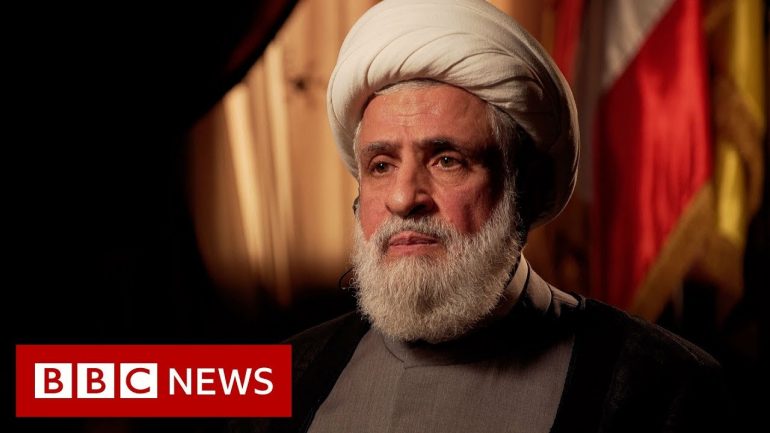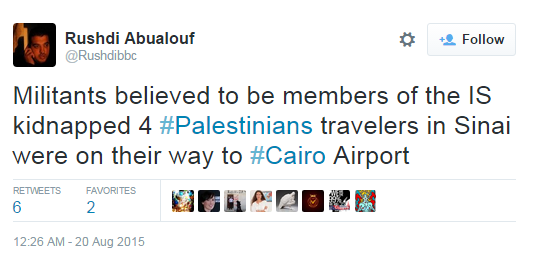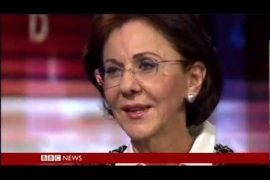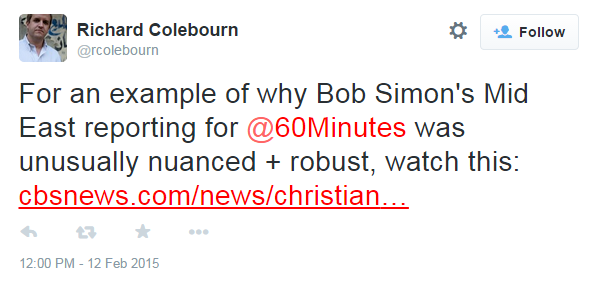The BBC editorial guidelines that came into effect in mid-July include the following in the section concerning ‘mandatory referrals’ relating to coverage of ‘War, Terror and Emergencies’:
“11.2.6 Any proposal to approach an organisation (or an individual member of an organisation) designated a ‘terrorist group’ by the Home Secretary under the Terrorism Acts, and any proposal to approach individuals or organisations responsible for acts of terror, to participate in our output must be referred in advance to Director Editorial Policy and Standards.”
Hizballah was designated in its entirety by the UK earlier this year and so we must presume that an interview with the terrorist organisation’s deputy leader by Jeremy Bowen that was aired on BBC Radio 4’s ‘Today’ programme on December 6th (as well as a longer filmed version which was promoted by BBC News) was approved in advance by the BBC’s Director of Editorial Policy and Standards, David Jordan.
The question that therefore arises is of what journalistic value was that specially approved interview? Did it provide BBC audiences with “a range and depth of analysis and content” which could not otherwise be achieved and did it contribute to their being better “informed citizens”?
‘Today’ co-presenter Mishal Husain introduced the item (from 2:36:22 here) with a pinch of Iranian propaganda.
[emphasis in italics in the original, emphasis in bold added]
Husain: “Protests in Iraq, Lebanon and in Iran where Iranian state television has said that those killed by security forces during last month’s mass protests against the petrol price rise were thugs and rioters. Our Middle East Editor Jeremy Bowen joins us now. What’s your reading of those protests, Jeremy?”
Bowen: “Well Mishal, you know, what’s interesting is that there are others who say that they weren’t thugs and rioters but they were protesting and they started protesting as well against the regime and that is why the security forces opened fire in the way that they did and killed so many people. Now it’s clear that the Iranians have got a big set of problems at the moment. Ah…the kind of thing we’ve been talking about at home. Maximum pressure as Trump calls them, American sanctions and also what’s important for them is they project power through their allies and in Iraq and Lebanon where there’ve been demonstrations – and those are generally regarded as Iranian allies – many people there see Iran as part of their problems.”
It is not clear what Bowen intended to communicate with that reference to “the kind of thing we’ve been talking about at home” and his description of Lebanon – rather than Hizballah – as an Iranian ally clearly does not enhance audience understanding of the topic.
Bowen: “It’s really hard for us to try and work out what’s going in Iran [laughs] partly because they won’t let us in there. Ahm…so one good way of doing it is talking to their friends like the organisation Hizballah who are in Lebanon and they are Iranian proteges but they’re very powerful as well. One of Israel’s big enemies along with Iran itself. Now I’ve just come back from Beirut and while I was there I talked to the deputy leader of Hizballah who’s a man called Naim Qassem. He’s late 60s, he wears robes, he’s got a white turban, gives the impression of being very shrewd actually, and intelligent and strong views about the region. And he doesn’t talk much so it was a good opportunity to talk about the Middle East and they’re uncomfortable about what’s happening. They like the status quo. So anyway I started off by asking Naim Qassem of Hizballah about the crisis in Lebanon.”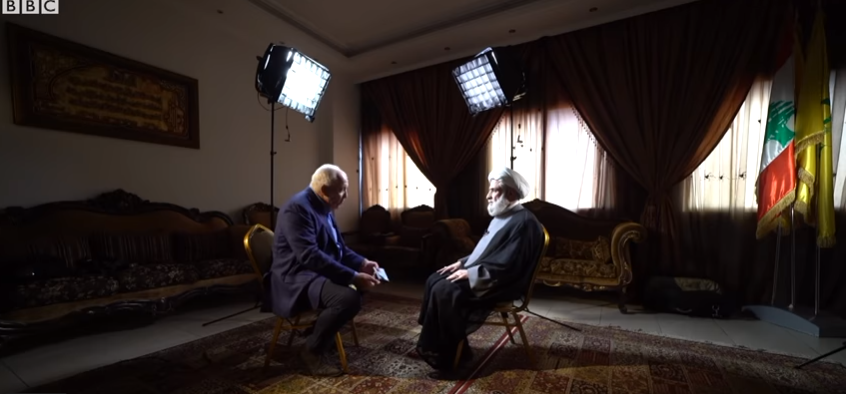
Obviously any interview with a representative of a terrorist organisation needs to be very carefully edited and presented so that audiences can put its inevitable propaganda into the appropriate context. Bowen’s sartorially focused introductory portrayal of Qassem clearly did not provide any meaningful background information about the terror group’s record or agenda. Neither were listeners given sufficient information about the current political crisis in Lebanon before they were exposed to Qassem’s allegations.
Qassem [voiceover]: “Of course the situation in Lebanon is very dangerous. Consequently you can see how the economic situation is collapsing. And you can see how people are suffering from the devaluation of the Lebanese currency. We cannot accept things to continue like this. So for this reason we said very clearly that the government has to be formed in order to put an end to this collapse and decline. And unfortunately there are some who are trying to cause damage to Lebanon and especially the United States. And every two or three days the US Secretary of State Pompeo makes statements and says he doesn’t want to see Hizballah in the government. And Hizballah is part of the people. So let America put a stop to its meddling.”
Bowen: “Now Secretary Pompeo in the US, like the British government, regard your organisation as a terrorist organisation. That’s why he says the things that he says.”
Qassem: “What concerns us is how our people view us. We as Hizballah in the minds of our people, we are a resistance that liberated the land. A party which serves the interests of the people and also serves for a better future for the people. And because America and Britain support Israel which is an occupying power, a power of aggression, a criminal power, they are taking political stance against Hizballah. If they label us as terrorists this doesn’t mean that their designation is right. We consider America to be the leading terrorist entity because it does not serve the interests of the people. The same goes for Britain as well.”
Bowen made no effort to inform listeners of the real background to the designation of Hizballah by the US, the UK and other nations and bodies or to provide factual information concerning the threats posed to Israel by Iran and Hizballah, including their military entrenchment in Syria.
Bowen: “You’re part of a coalition led by Iran that faces off against Israel and by implication against the United States as well. Iran is in real trouble at the moment, isn’t it? There are anti-Iran demonstrations in Iraq, there is feeling against Iran in this country and there’ve been big demonstration inside…demonstrations inside Iran itself. Your friends in Iran are in trouble, aren’t they?”
Qassem: “First of all we don’t deny that we are part of an axis led by Iran because Iran advocates the causes of the people’s rights and also supports the resistance. It believes in justice. It believes in the liberation of Palestine. Now, when it comes to the problems within Iran because of the decision to increase the price of gasoline, this is a domestic matter related to Iran.”
Audiences should of course have been informed at this point that in Hizballah-speak “the liberation of Palestine” means the annihilation of Israel.
Bowen: “Now with your allies in Iran you have amassed an enormous arsenal of rockets and missiles including guided missiles that presumably you’d use in a war with Israel. Under what circumstances would you use that arsenal of weapons?”
Qassem: “We are a resistance and we are defending. If Israel were to launch an aggression or attack us, we will respond. And so we don’t have any plans when it comes to initiating any confrontation with Israel. But we are determined to respond to Israel if it were to attack. Israel understands this language only. It won’t be deterred except if we are strong.”
Bowen made no effort to counter that propaganda by, for example, reminding listeners that it was Hizballah which initiated the 2006 conflict and Hizballah which just a year ago had its cross-border tunnels exposed and destroyed. Neither did he bother to clarify the background to any hypothetical attack on Iran’s “nuclear facilities”.
Bowen: “What if Israel or the US attacked Iran; attacked its nuclear facilities? Would you then use your weapons against Israel?”
Qassem: “I don’t know what could happen but what I do know is that any aggression of such scale could ignite the whole region. And those who initiated the aggression will take a big responsibility and also take responsibility for very large-scale reactions. My estimation is that war with Israel is unlikely at this stage. The balance of deterrence is what contributes to the absence of war because they are not convinced of what the results would be if a war were to take place.”
The interview ended there with a laconic statement from co-presenter Martha Kearney.
Kearney: “And that report was by Jeremy Bowen.”
In his introduction Bowen claimed that “one good way” to try to “work out” what is going on in Iran “is talking to their friends like the organisation Hizballah”. Whether or not that was also the rationale given when approval was sought to interview a senior figure in “an organisation […] designated a ‘terrorist group’ by the Home Secretary” is of course unknown but obviously this interview contributed nothing at all to that supposed aim.
In fact all audiences heard was over four minutes of barely challenged propaganda from the number two in a notorious terrorist organisation: propaganda that they could just as easily have found on Hizballah’s own media channels – and without paying a licence fee.
Related Articles:
Why the new BBC editorial guidelines may not mean less terror showcasing

